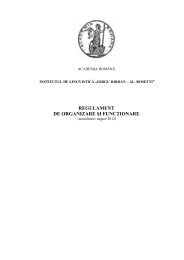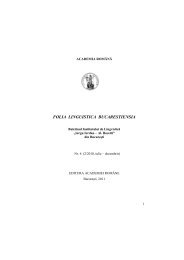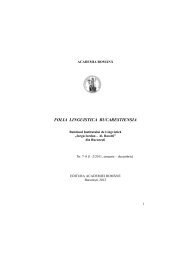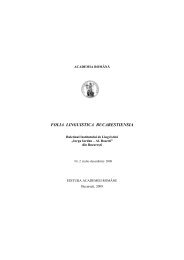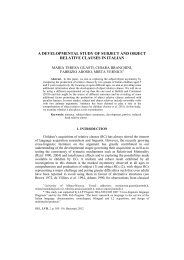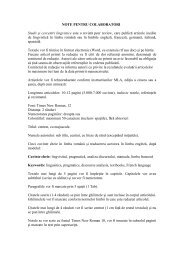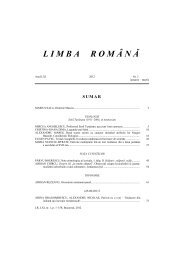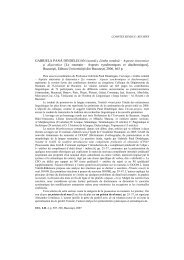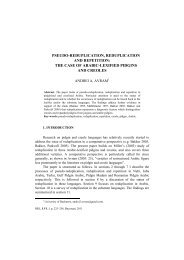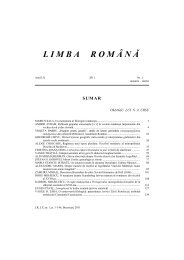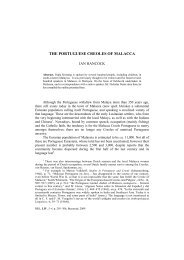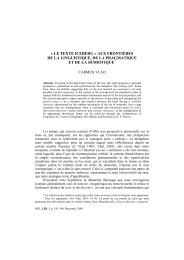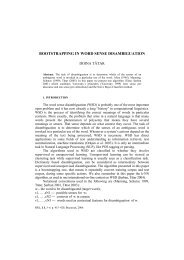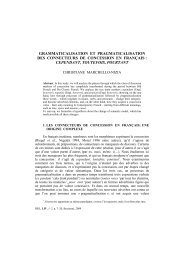'NOTHING' OR 'ANYTHING': TERMS IN IRISH AND SCOTTISH ...
'NOTHING' OR 'ANYTHING': TERMS IN IRISH AND SCOTTISH ...
'NOTHING' OR 'ANYTHING': TERMS IN IRISH AND SCOTTISH ...
You also want an ePaper? Increase the reach of your titles
YUMPU automatically turns print PDFs into web optimized ePapers that Google loves.
216Seosamh Watson 125.0. The final category connected to the senses is that of taste.5.1. blas: the only instance within this category that LASID provides is blas‘taste’, qualified by aon or ar bith and not restricted, as confirmed by McKenna(1935: 893), to food. Again the focus is the western Irish province of Connachtwith 5 examples from 4 atlas points. The distribution is comparable to that of ceo,except that it is even more limited. The Early Irish form of this word is mlas, withwhich the only connections, cf. LEIA (: M-56) would appear to be Slavic forms, cf.Rus. molsātĭ ‘suck’, Czech mlsati ‘taste’.5.2. gráinne: this form is cited in the sense of ‘none’ by McKenna (1935: 45)with reference, it would seem, to solid foodstuffs such as tea. The correspondingScottish Gaelic form gràine is widely used in a generalised sense of ‘a tiny amount,a few’, negative ‘not a pick’, cf. Wentworth (2003: 74) cha robh gràine rifhaighinn ‘there wasn’t a bit to be had’. The Early Irish form gráinde ‘cerealgrain’,cf. Kelly (2000: 560-1) constitutes a singulative form of grán, itself aborrowing from Lat. grānum.5.3.1. greim: de Bhaldraithe (1959: 480) cites this word with the meaning of‘not (eating) a bite’. The word is, of course, common in Ireland and Scotland inthe sense of a ‘bite’. For the Early Irish is greim(m) with the basic sense of a ‘hold,grip’, cf. perhaps Goth. greipan, ON grípa, Buck (1949: 744-7).5.3.2. smailc: this is recorded by McKenna (1935: 893) for Munster in thesense of nothing being ar ‘on’, i.e. wrong with, someone (cf. 2.3.2). The samesource also notes the use of ceo (3.2) in this sense. The basic sense of the word is a‘bite, mouthful’, for it has also been recorded in use in a N. Connacht dialect 6signifying ‘nothing’ with reference to eating, while in a neighbouring dialect ofEnglish, cf. Ó Muirithe (1996: 181) the verb smailc signifies to ‘eat voraciously’.This verb can also be used in the latter dialect, as in dialects of Irish, in the sense ofto ‘smack’, as of children, a connection which brings into question the possibilityof its being an English loanword in origin. McKenna also gives an expandedversion, namely smailc ná smáil, the final word here, standard smál. Early Irishsmál, smól, whose etymology is unclear, appears to have a primary sense of ‘fire,blaze’ cf. LEIA (: S-140).5.4. deoir: McKenna cites this word (1935: 45, deor) for Connacht andMunster as signifying ‘none’ with reference to drinking, which, of course, parallelsthe use of greim (v 5.3.1) to signify the smallest amount possible of solid food. TheEarly Irish form is dér ‘tear, drop’, for which a common origin is cited, cf. LEIA(: D-54-5) with Goth. tagr ‘tear’ etc.6 Informant of Prof. Séamas Ó Catháin’s.



